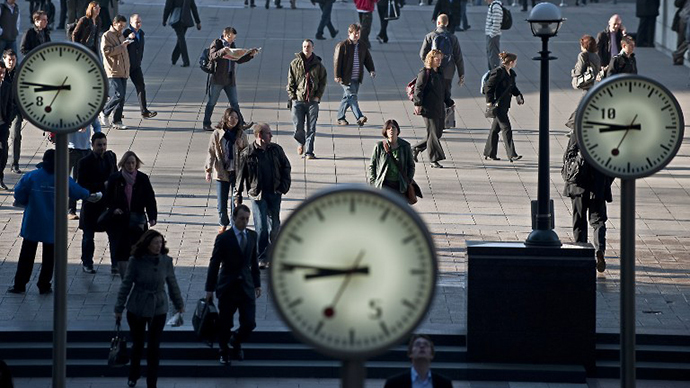Shorter working week, more social and economic benefit – report

Reducing the working week from 40 hours to 30 is not what all employees exactly crave, but it could be economically beneficial, the New Economics Foundation says. Fewer working hours would create more jobs, improve health and stimulate social life.
Modern life provides people with a number of opportunities as never before. However, work consumes free time and drains energy. In order to decrease working hours and make-part time full-time, companies can give their employees more leisure time instead of increasing wages.
A group of eight economists from the New Economics Foundation suggested, that the passage from a 40 to a 30-hour working week would ease employees’ lives, improve health, open up more opportunities and stimulate social life - proof of the theory stated in the “Time on our side” book.
Time is money. The experience of some western countries may prove it’s visa-versa.
Belgium and Netherlands have a 30-hour working week without causing any damage to the economy.
The average German worker puts in 35 hours a week, however the German economy is the world’s fourth largest. The country also excludes Sunday workdays, and the unemployment rate confidently sits at 5 percent, while in the United States it’s 7 percent.
“If higher paid workers started to work less hours, it would become a desirable thing. It would be something to aspire to,” Anna Coote, the “Time on our side” co-author asserts.
Historically, the trend has been going down since the 19th century. At that time some people suffered 7-day work weeks, enduring 15 hours a day, 6 days a week, plus 8 to10 hours on Sunday.
In the 20th century ideas of social equality coupled with industrial action and the setting up of unions reformed and improved these drastic working hours.
Today s reduced working week will lower the pressure on careers, and free up time for both male and female employees. This will help couples achieve a good work life balance so that they can juggle their domestic responsibilities and maintain better family life.
Lack of time and money are cancers in society and inequalities between the rich and poor are widening. The difference between those who have plenty of control over their time and those who don't should be diminished.
According to expert opinion, more than a quarter of reported sickness is due to work problems. Results of a recent poll, carried out by the European association for the fight against depression, showed that every fourth Briton lives in stress. While in Italy, people with depression account for only 12% of the population.
Economists are sure that reduced working weeks will mean less illness among employees, which will lead to more productivity and create new jobs. The authors of the research recognize that employees will earn less, but that in the long run it will be beneficial for society and the environment.
If a 4-day working week was introduced, a typical work week for any given employee and their additional day off might be scheduled as follows: 1st Monday of month, 2nd Tuesday of month, 3rd Thursday of month, the 4th Friday of month. The new day off will ease pressures at work and reduce the instances of pretending to be sick to get time off.
Finally, reducing the working week will decrease road traffic in densely populated cities, and help authorities alleviate the strain and cost of running transport hubs, rail networks and roads.















